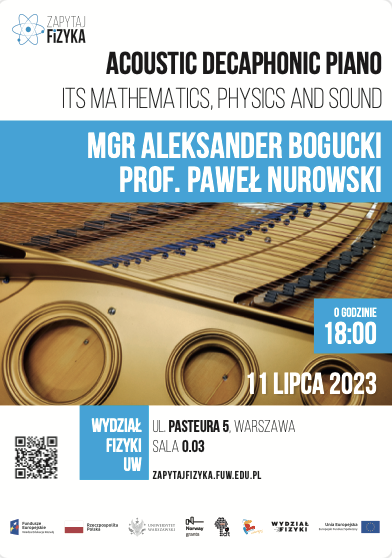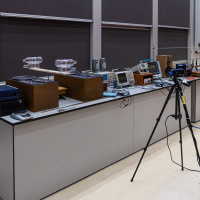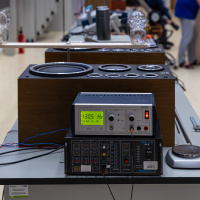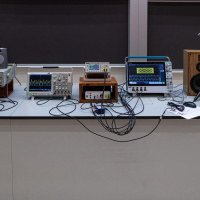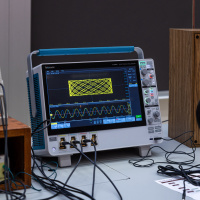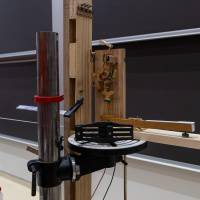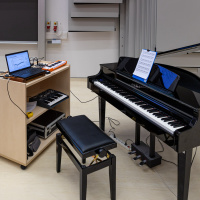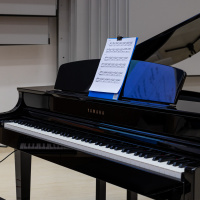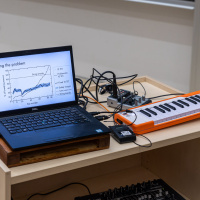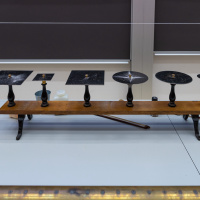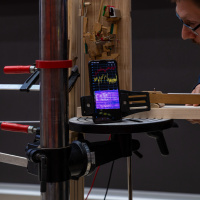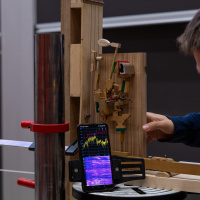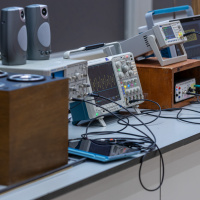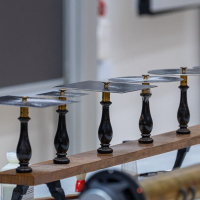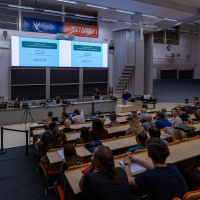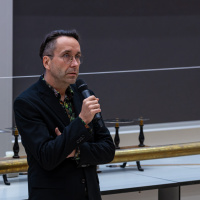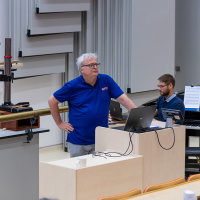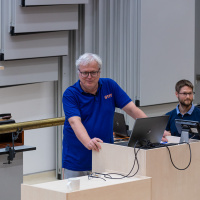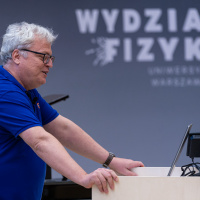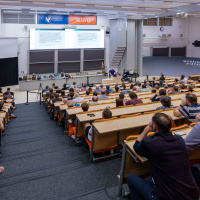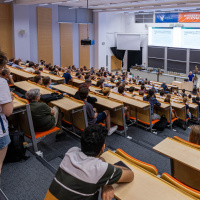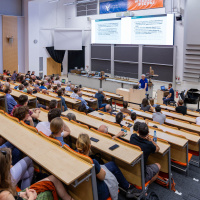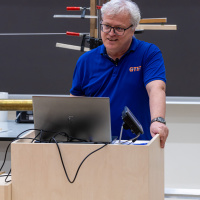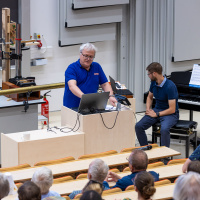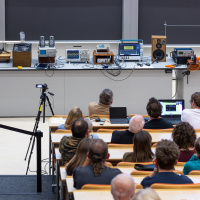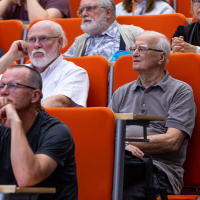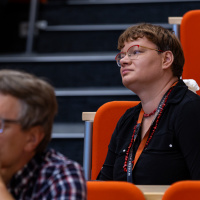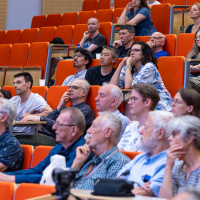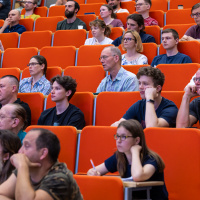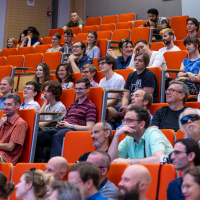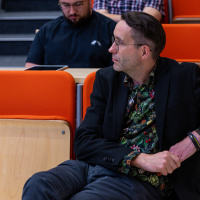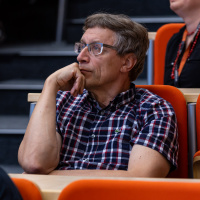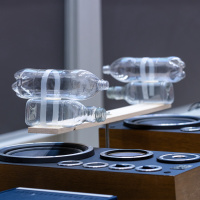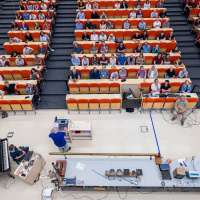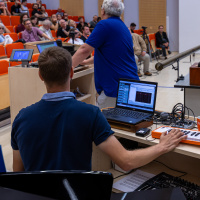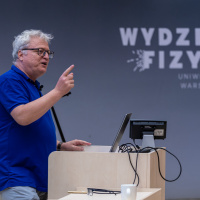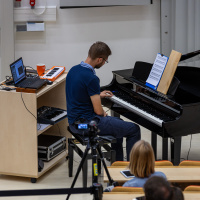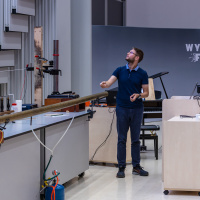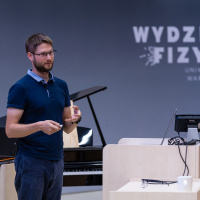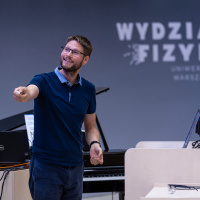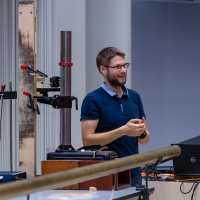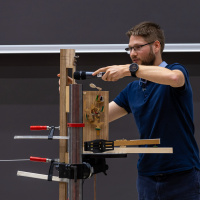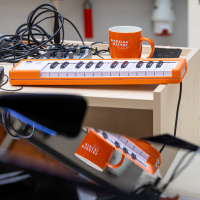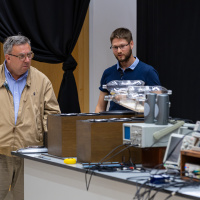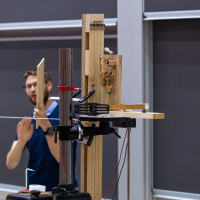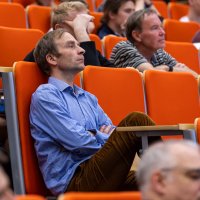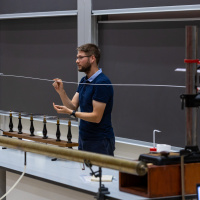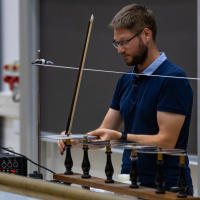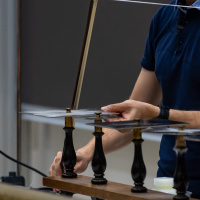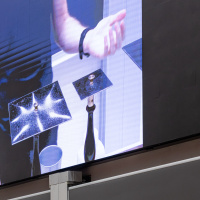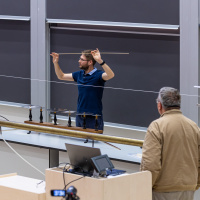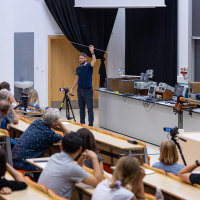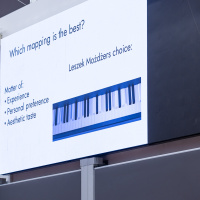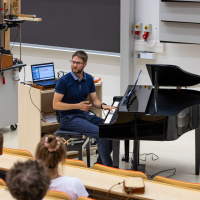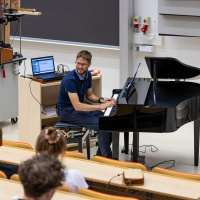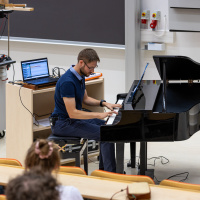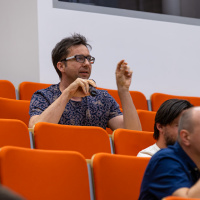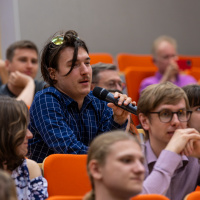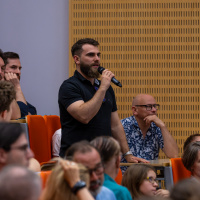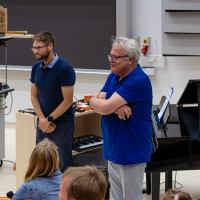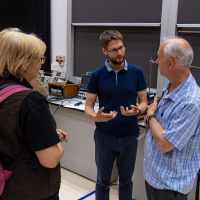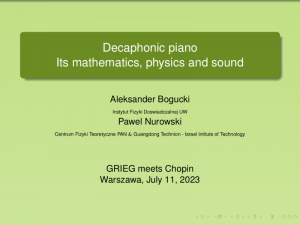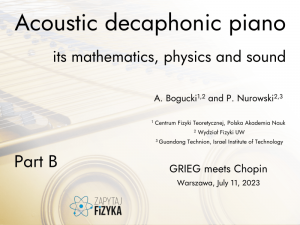W ramach projektu „Zapytaj fizyka” organizujemy serię wykładów popularnonaukowych, wygłaszanych przez znamienitych naukowców i popularyzatorów nauki. Wykłady te odbywają się mniej więcej raz na miesiąc na Wydziale Fizyki Uniwersytetu Warszawskiego (ul. Pasteura 5, sala 0.03).
Acoustic decaphonic piano – its mathematics, physics and sound

Mgr Aleksander Bogucki
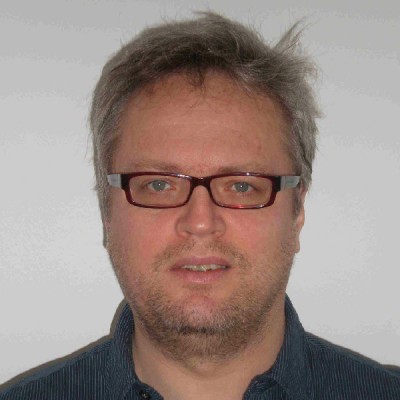
Prof. Paweł Nurowski
Prof. Paweł Nurowski – absolwent Wydziału Fizyki Uniwersytetu Warszawskiego. Studia doktoranckie odbywał w Uniwersytecie Piotra i Marii Curie w Paryżu oraz w Wyższej Szkole Studiów Zaawansowanych (SISSA) w Trieście. Doktorat z fizyki matematycznej obronił w roku 1991 w SISSA. Przez wiele lat, aż do uzyskania tytułu profesora, pracował w Instytucie Fizyki Teoretycznej Wydziału Fizyki UW. Obecnie jest profesorem fizyki w Centrum Fizyki Teoretycznej PAN i profesorem matematyki w Guangdong Technion – Israel Institute of Technology w Shantou w Chinach. Autor ponad osiemdziesięciu prac z zakresu ogólnej teorii względności, geometrii różniczkowej i astronomii, opublikowanych w najbardziej prestiżowych światowych czasopismach naukowych. Pracował jako profesor wizytujący w Uniwersytecie Stony Brook w Nowym Jorku, w Stanowym Uniwersytecie Logan w Utah, w Narodowym Uniwersytecie w Canberrze, w Uniwersytecie Humboldtów w Berlinie, oraz w Uniwersytecie i na Politechnice w Turynie. Ma bardzo rozległe zainteresowania naukowe: od czysto abstrakcyjnej geometrii różniczkowej, poprzez teorię sterowania, po obserwacyjną astrofizykę. Światowy ekspert w dziedzinie geometrii różniczkowej ze szczególnym uwzględnieniem jej zastosowań w fizyce.
Mgr Aleksander Bogucki – absolwent Wydziału Fizyki Uniwersytetu Warszawskiego, autor pracy doktorskiej z zakresu fizyki ciała stałego. Chętnie zajmuje się popularyzacją fizyki, prowadząc pokazy doświadczeń fizycznych, ale także wymyślając nowe demonstracje. Jego drugą pasją jest muzyka, którą realizuje od lat grając na fortepianie oraz śpiewając w Chórze Wydziału Fizyki Uniwersytetu Warszawskiego.
Bohaterem niniejszego wykładu będzie fortepian dekafoniczny, akustyczny instrument koncertowy stworzony na zamówienie światowej sławy pianisty jazzowego Leszka Możdżera. Fortepian jest dekafoniczny, ponieważ zawiera tylko dziesięć dźwięków w całej oktawie, podczas gdy tradycyjny instrument oparty jest na skali dwunastodźwiękowej. System strojenia fortepianu to 10-stopniowy system równomiernie temperowany, w przeciwieństwie do tradycyjnego 12-stopniowego systemu temperancji używanego przez większość muzyków w świecie zachodnim od czasów Jana Sebastiana Bacha. Akustyczny fortepian dekafoniczny został stworzony przez Aleksandra Boguckiego, fizyka z Instytutu Fizyki Doświadczalnej Wydziału Fizyki Uniwersytetu Warszawskiego, Pawła Nurowskiego, matematyka z Centrum Fizyki Teoretycznej PAN, Andrzeja Włodarczyka, konstruktora i specjalistę od fortepianów historycznych, Leszka Możdżera – pomysłodawcę projektu. Klawiaturę wykonuje Ryszard Mariański, Obudowa – Roman Galiński z Iławy, akustyka – Sławomir Rosa; mechanika, regulacja, intonacja i strojenie – Jan Grzyśka i Mirek Mastalerz. Jest to pierwszy tego typu akustyczny instrument klawiszowy na świecie.
Podczas wykładu Aleksander Bogucki i Paweł Nurowski, wyjaśnią z jakimi wyzwaniami naukowymi, trudnościami technicznymi, a także kwestiami estetycznymi musieli się zmierzyć, aby stworzyć tak innowacyjny instrument. W trakcie prelekcji uczestnicy zapoznają się od podstaw z zasadami matematycznymi różnych systemów strojenia stosowanych w historii muzyki zachodniej, od strojenia pitagorejskiego, przez strojenie naturalne („just intonation”) po system równomiernie temperowany, a także dowiedzą się, jak system strojenia fortepianu dekafonicznego ma się do tych klasycznych pojęć. Będą także mieli możliwość wysłuchania brzmienia poszczególnych systemów strojenia, zaprezentowanych przez Aleksandra Boguckiego na pianinie elektronicznym. Wykładowi towarzyszyć będzie także szereg nowatorskich eksperymentów ilustrujących zjawiska związane z fizyką dźwięku, zaprojektowanych przez Aleksandra Boguckiego, Pawła Trautmana oraz Andrzeja Włodarczyka.
Nowo powstały fortepian dekafonicznego oraz jego brzmienie zostaną zaprezentowane na koncercie Leszka Możdżera, który odbędzie się w sali koncertowej Nowa Miodowa w Warszawie 13 lipca 2023.
Wykład odbywa się w ramach konferencji „GRIEG meets Chopin” i jest finansowany ze środków Norweskiego Mechanizmu Finansowego 2014-2021, z projektu o numerze 2019/34/H/ST1/00636.
Prof. Pawel Nurowski – a graduate of the Faculty of Physics at the University of Warsaw. He did his doctoral studies at the Peter and Marie Curie University in Paris and at the School of Advanced Studies (SISSA) in Trieste. He received his PhD in mathematical physics from SISSA in 1991. For many years, until he became a professor, he worked at the Institute of Theoretical Physics of the UW Faculty of Physics. He is currently professor of physics at the Center for Theoretical Physics of the Polish Academy of Sciences and professor of mathematics at the Guangdong Technion – Israel Institute of Technology in Shantou, China. He is the author of more than eighty papers on general relativity theory, differential geometry and astronomy, published in the world’s most prestigious scientific journals. He has worked as a visiting professor at Stony Brook University in New York, Logan State University in Utah, the National University of Canberra, Humboldt University in Berlin, and the University and Polytechnic University of Turin. His research interests range from purely abstract differential geometry, through control theory, to observational astrophysics. He is a world expert in differential geometry with a particular focus on its applications in physics.
Aleksander Bogucki, M.Sc. – a graduate of the Faculty of Physics at the University of Warsaw, author of a doctoral thesis in solid state physics. He is eager to popularize physics, conducting demonstrations of physical experiments, but also inventing new demonstrations. His other passion is music, which he has been pursuing for years by playing the piano and singing in the Choir of the Faculty of Physics at the University of Warsaw.
The hero of this lecture, the decaphonic piano, is and acoustic concert hall instrument created on the demand of the world famous jazz pianist Leszek Możdżer. The piano is decaphonic because it contains only ten notes in the entire octave, while the traditional instrument is based on a twelve-note scale. Piano’s musical tuning system is the ten scale well temperament, as opposed to the 12 scale well temperament used by musicians in most of Western music since the times of J. S. Bach. The acoustic decaphonic piano was created by Aleksander Bogucki, a physicist from the Institute of Experimental Physics Faculty of Physics of the University of Warsaw, Paweł Nurowski, a mathematician from the Center for Theoretical Physics of the Polish Academy of Sciences, Andrzej Włodarczyk, a constructor and a specialist of ancient pianos, Leszek Możdżer – the initiator of the project. The keyboard is made by Ryszard Marinski, casing – Roman Galiński from Ilawa, acoustics – Slawomir Rosa; mechanics, regulation, intonation and tuning – Jan Grzyśka and Mirek Mastalerz. As far as we know, it is the first such musical piano instrument in the world.
In this lecture, Aleksander Bogucki and Paweł Nurowski, the scientific designers of the piano, will explain technical difficulties, scientific obstacles and esthetical issues, which they had to overcome to create an actual physical copy of the instrument. All the relevant scientific information to understand the innovative nature of the instrument, and motivations for creating it, will be explained. In particular, they will explain the mathematics principles of various musical tuning systems used in the history of western music, so that after the lecture everybody will know what the Pythagorean tuning, just intonation and well temperament is, and how the tuning system of the new instrument is related to these classical notions. Lecturers will try to argue that mathematics prefers the tuning system employed in the decaphonic piano.
The participants of the lecture will also have the opportunity to hear the sound of various tuning systems, presented by Aleksander Bogucki on an electronic piano. The physics theory of sound, needed to understand the difficulties in creating a physical copy of the instrument, will be explained and illustrated by a number of experiments designed by Aleksander Bogucki, Pawel Trautman and Andrzej Włodarczyk.
The copy of the decaphonic piano, and its sound will be presented in a separate event, at a concert of Leszek Możdżer, which will be held in the Concert Hall Nowa Miodowa in Warsaw on 13th of July 2023.
The lecture is organized as a part of conference “GRIEG meets Chopin” and is funded by the Norwegian Financial Mechanism 2014-2021, with project registration number 2019/34/H/ST1/00636.


